高中语法-情景对话
高三英语语法专题练习
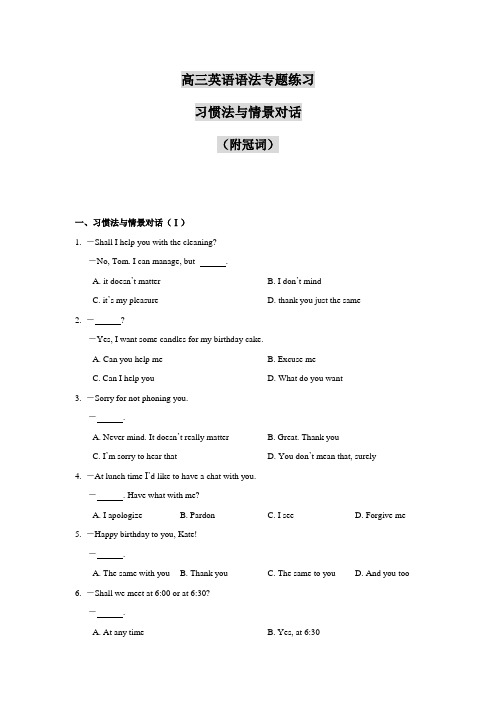
高三英语语法专题练习习惯法与情景对话(附冠词)一、习惯法与情景对话(Ⅰ)1. -Shall I help you with the cleaning?-No, Tom. I can manage, but .A. it doesn’t matterB. I don’t mindC. it’s my pleasureD. thank you just the same2. -?-Yes, I want some candles for my birthday cake.A. Can you help meB. Excuse meC. Can I help youD. What do you want3. -Sorry for not phoning you.-.A. Never mind. It doesn’t really matterB. Great. Thank youC. I’m sorry to hear thatD. You don’t mean that, surely4. -At lunch time I’d like to have a chat with you.-. Have what with me?A. I apologizeB. PardonC. I seeD. Forgive me5. -Happy birthday to you, Kate!-.A. The same with youB. Thank youC. The same to youD. And you too6. -Shall we meet at 6:00 or at 6:30?-.A. At any timeB. Yes, at 6:30C. Well, either time will doD. Any time is OK7. -I have two tickets for the film, will you go with me?-Yes, .A. it’s pleasureB. with pleasureC. thankD. I shall8. -How long have your parents been in Shanghai?-the end of the war.A. InB. SinceC. ByD. At9. ―?―Yes, this is Mary speaking.A. Are you MaryB. Who are youC. Who’s thatD. Is that Mary speaking10. ―can your mother come back from London?―In two days.A. How oftenB. How soonC. How longD. What time11. ―.―Thank you, I certainly will.A. Happy birthday to youB. Let me help you with your mathsC. Please remember me to your mumD. Don’t forget to post the letter12. ―Congratulations on winning the first prize in the tennis game!―.A. It’s nothing unusualB. The same as youC. I’m just very luckyD. Success belongs to me13. ―Would you do me a favor and give me a ride?―.A. Yes, that’s rightB. No troubleC. Never mindD. With pleasure14. ―?―He is a nice person.A. What is your new teacher likeB. What does your new teacher look likeC. How is your new teacherD. How does your new teacher look15. ―Do you think it’s going to rain this evening?―.A. I hope notB. I don’t thinkC. I don’t hope soD. I don’t believe it16. ―Thank you ever so much for the book you sent me.―.A. No thanksB. I’m glad you like itC. Please don’t say soD. No, it’s not so good17. ―Are you satisfied with her answer?―Not at all. It couldn’t have been .A. worseB. so badC. betterD. the worst18. ―We quarreled with the waiter about the bill.―How silly! You the manager.A. should have toldB. would have toldC. could talk toD. must talk to19. ―I’ll go for the new job.―! I hope you will do well.A. Good wishB. Good chanceC. Good jobD. Good luck20. ―Is this raincoat yours?―No, mine there behind the door.A. is hangingB. has hungC. hangsD. hung21. ―Excuse me. Have you been to London recently?―.A. No, I don’tB. Not yetC. Sorry, I can’tD. Never, but I like22. ―I’d like to invite you to dinner this Saturday, Mr Smith.―.A. Oh, no. Let’s notB. I’d rather stay at homeC. I’m very sorry, but I have other plansD. Oh, no. That’ll be too much trouble23. ―Will you please go outing with me this Sunday?―, but I have a lot of work to do.A. I’m afraid I can’tB. Yes, I’m glad toC. That’s a good ideaD. Sorry, I’d like to24. ―I’m sorry I broke your mirror.―Oh, really? .A. It’s OK with meB. It doesn’t matterC. Don’t be sorryD. I don’t care25. ―I had a really good weekend at my uncle’s.―.A. Oh, that’s very nice of youB. CongratulationsC. It’s a pleasureD. Oh, I’m glad to hear that26. ―Hi, haven’t seen you for ages! You look fine.―. You look well, too.A. GreatB. ThanksC. Oh, noD. Not at all27. ―Are the new rules working?―Yes. book are stolen.A. FewB. MoreC. SomeD. None28. ―Do you think it’s going to rain over the weekend?―.A. I don’t believeB. I don’t believe itC. I believe not soD. I believe not29. ―Will you please spare me a few minutes right now?―. But I’ll be free this afternoon.A. No, I don’tB. I’m afraid notC. Yes, pleaseD. Yes, I’d love to30. ―Please don’t make a noise.―. I’ll be as quiet as a mouse.A. Yes, I won’tB. No, I won’tC. No, I willD. Yes, I will31. ―Will you join us in a walk?―Thank you, but . I have something important to do.A. I wouldn’t betterB. I’d not ratherC. I’d better notD. I’d rather not32. Don’t smoke in the meeting room, ?A. do youB. will youC. can youD. could you33. ―Thank you for giving me so much help.―.A. Don’t mention itB. Yes, I should doC. Never mindD. It doesn’t matter34. ―Do you mind my taking this seat?―.A. Yes, sit down pleaseB. No, of course notC. Yes, take it pleaseD. No, you can’t take it35. ―Could you do me the favor to carry the big shelf?―.A. GreatB. With pleasureC. Yes, I couldD. It’s my pleasure36. -Excuse me, could I use your pen for a few minutes, please?-.A. You use it yourselfB. Don’t be politeC. Take it easyD. Help yourself37. ―Would you like to go to Kate’s birthday party?―. But when is it?A. Yes, I doB. Yes, I’d love toC. No, I’m afraid notD. Of course not38. It’s a fine day. Let’s go fishing, ?A. won’t weB. doesn’t sheC. don’t weD. shall we39. ―Do you know it is from here to the station?―Yes, it’s about five miles.A. how farB. how longC. how manyD. how much40. ―Do you have a big library?―No, we don’t, at least, not yours.A. the same sizeB. as well asC. bigger thanD. smaller than二、习惯法与情景对话(Ⅱ)1. -Wang Ming’s father passed away.-.A. ReallyB. What a terrible newsC. I’m sorry to hear thatD. Is it true2. ―You don’t mind me smoking here, do you?―.A. No, I really hate smokingB. I’d appreciate it if you didn’tC. No, you can’t smoke hereD. You’d better give up smoking3. ―Will you be able to get a taxi to the theatre?―, sir.A. No necessaryB. No problemC. I’m gladD. That’ll be fine4. ―I expect everything will turn out as you wish.―.A. All rightB. The same to youC. No, thanksD. I’d like to5. ―I wonder if I could go up by lift?―.A. Of course, here you areB. I don’t wonderC. Sorry, it’s out of orderD. Your are welcome6. ―Can I get you a cup of tea?―.A. That’s very kind of youB. With pleasureC. You can, pleaseD. Thank you for the tea7. ―I hear he’s learning to drive.―Yes, but I don’t think he can pass the driving test. ?A. Do you think soB. How about himC. Does heD. How do you like him8. ―I wonder if you would let me have a look at your stamp collection now.―.A. Yes, pleaseB. Yes, please don’tC. No, please doD. No, go ahead9. ―How’s the young man?―.A. He’s handsomeB. He’s a doctorC. He’s much betterD. He’s David10. ―?―No, thanks, but I can do it myself.A. What can I do for youB. What are you going to doC. Can I help you with the houseworkD. Can I go there with you11. -You look very beautiful in that dress. Where did you get it?-.A. It’s none of your businessB. Oh yes. It was very cheapC. Thank you. It’s a presentD. Please don’t mention it12. ―Would you like to come to dinner tonight?―I’d like to, I’m too busy.A. andB. soC. asD. but13. ―The music is too loud. Could you please turn down the radio a bit?―A. Sorry, I didn’t know you were reading.B. Don’t trouble. I like music.C. Don’t you think the music is beautiful?D. Oh, it’s an honour for me to do so.14. ―Many thanks for having me in your home for so many days.―.A. The same to youB. Don’t care about itC. It’s my pleasureD. It doesn’t matter15. Don’t all speak at once! .A. Each at one timeB. One by one timeC. One for each timeD. One at a time16. ―?―It depends on what it is.A. How about going shopping with usB. Remember me to your family, will youC. Will you please buy me some postcards thereD. Would you please do me a favor17. ―I’m glad to see you here.―.A. Thank youB. The same to youC. Me, tooD. All the same18. ―Have a nice weekend!A. The same as youB. You, tooC. The same to youD. You have it too19. ―You cooked us a wonderful meal, Mrs Jackson!―.A. Please don’t say soB. I don’t think so myselfC. No, just so-soD. Thank you. I’m glad you enjoyed it20. ―May I speak to Miss Liu, please?―Hold on a moment. Miss Liu! on the phone.A. Someone is looking for youB. Here is a telephone for youC. You’re calledD. You’re wanted21. ―Can you come to Monday or Tuesday?―I’m afraid day is possible.A. eitherB. neitherC. bothD. any22. ―How could you say that?―. I didn’t mean to hurt you.A. That’s all rightB. I won’t regretC. Excuse meD. I’m really sorry23. -You seem to get lost. Need help?-A. Yes, would you please help me with the bag?B. Help me find my key, please.C. Yes, give me a hand, please.D. I am looking for Zhongshan Road.24. ―You haven’t been to Beijing, have you?―. How I wish to go there!A. Yes, I haveB. Yes, I haven’tC. No, I haveD. No, I haven’t25. ―I think I’m coming down with a cold.―A. You say that again and again.B. Let’s get something to eat, shall we?C. Well, I suggest you go to have a rest.D. Then you’d better see a doctor.26. ―You couldn’t have chosen any gift better for me.A. Oh, don’t find fault with my giftB. I’m sorry. I’ll give you a better one next time.C. I’m very glad you like it so much.D. You have a gift of music, don’t you?27. ―Nancy is not coming tonight.―But she !A. promisesB. promisedC. will promiseD. had promised28. -.-There’s nothing to worry about. I never liked it anyway.A. I lost my MP3 this morningB. I feel awful. I’ve got a coldC. I feel terrible, but I’ve left your CD somewhereD. I’m sorry, but we don’t have that medicine29. ―Let me introduce myself, I’m Albert.―.A. What a pleasureB. I t’s my pleasureC. Pleased to meet youD. I’m very pleased30. ―Hi, Tracy, you look tired.―I am tired. I the living room all day.A. paintedB. had paintedC. have been paintingD. have painted31. ―I’ll be away on a business trip. Would you mind looking after my cat?―Not at all. .A. I have not timeB. I’d rather notC. I’d like itD. I’d be happy to32. ―Hello. May I speak to Zhao Hua?―Yes. .A. My name’s Zhao HuaB. I’m Zhao HuaC. This is Zhao Hua speakingD. Zhao Hua’s me33. ―Do you know our town at all?―No, this is the first time I here.A. wasB. have beenC. cameD. am coming34. It is nice that you have someone you off.A. seeingB. seenC. seeD. to see35. -.-Very well, thank you, And you?A. Good nightB. How do you doC. How do you like EnglishD. How are you三、冠词1. I ordered book some time ago. book has arrived.A. a, TheB. the, AC. a, AD. 1, The2. Mr Smith is European and his wife is American.A. an, anB. a, aC. a, anD. an, a3. We are going to have x-ray check.A. aB. anC. theD. one4. My sister works in a factory, she goes home once month.A. aB. anC. theD. every5. Her dress was spotlessly clean and well made, but it was which the daughter of a poorman might have worn.A. the kind of dressB. the kind of the dressC. a kind of dressD. a kind of a dress6. He was absent because he had caught .A. heavy a coldB. the heavy coldC. a heavy coldD. heavy cold7. He had fall in the dark.A. aB. anC. theD. /8. In winter people often hang up wet clothes near fire.A. /, /B. the, /C. /, aD. the, a9. I didn’t like lunch we had yesterday.A. myB. /C. theD. a10. Mr Li is suffering from a cold in .A. the headB. a headC. headD. his head11. My brother said he bought dictionary week before and dictionarywas help to him.A. a, the, the, aB. a, the, the, /C. a, /, a, /D. the, a, the, a12. The brave boy and honest girl are talking over there.A. aB. thisC. theD. /13. Some people say that British are funny people.A. the, aB. /, theC. the, theD. the, /14. Tom left Shanghai in .A. the summer 1985B. summer 1985C. 1985 the summerD. the summer of 198515. They say that Japanese Language is particularly difficult for European.A. the, anB. /, theC. the, aD. /, a16. children here live most happy life.A. The, theB. The, aC. The, /D. /, the17. The overseas Chinese have great love for motherland.A. a, theirB. /, theirC. /, theD. a, the18. The soldier died during World War I.A. theB. the firstC. /D. a19. We elected him head of the workshop.A. aB. theC. oneD. /20. sun setting in west, I saw bird flying south.A. The, /, theB. The, the, /C. /, /, /D. The, the, the21. singer and dancer has accepted the invitation.A. A, aB. The, theC. The, aD. The, /22. In Marx began to learn Russian.A. the 1870s’B. 1870sC. 1870’sD. the 1870s23. United States of America lies between Atlantic Ocean and Pacific Ocean.A. The, the, theB. /, /, /C. The, /, /D. /, the, the24. Alice is of the two girls.A. tallerB. the tallC. more tallD. the taller25. Look. They have finished supper. They are still sitting . They are talking.A. at tableB. at the tableC. near the tableD. on the table26. It is know to us that boils at 100℃.A. a waterB. the waterC. watersD. water27. The man was once thrown into prison for robbing the bank.A. aB. anC. theD. /28. Many people are still in habit of writing silly things in public places.A. the, theB. /, /C. the, /D. /, the29. He went hungrily from door to door.A. the, theB. /, /C. the, /D. /, the30. We had wonderful lunch last Saturday.A. aB. oneC. theD. /31. We walked together arm in arm.A. with, anB. an, anC. /, /D. the, the32. Einstein did manage to send Einstein to a technical school.A. /, aB. An, anC. The, /D. /, /33. Mount Tai is in the east of China.A. AB. TheC. /D. That34. The scientist is really Einstein of our time.A. anB. theC. aD. one35. I like history. I am studying history of China.A. the, /B. /, theC. a, /D. /, a36. Tom enjoys playing football while I enjoy music, I can play pianovery well.A. the, the, theB. /, the, theC. /, /, /D. /, /, the37. The lake is at this point.A. deepestB. the deepestC. most deepD. the most deep38. Ronald Reagan was elected of the United States in 1981.A. the presidentB. a presidentC. as presidentD. president39. On October 1, the Chinese people celebrated with new achievements and victories.A. National DayB. the National DayC. our National DayD. a National Day40. In 1969, two Americans got to the moon by spaceship, how I wish I could also fly tothe moon in spaceship some day!A. a, aB. /, /C. /, theD. /, a参考答案一、1-5 DCABB 6-10 CBBDB 11-15 CCDAA 16-20 BAADA21-25 BCBBD 26-30 BADBB 31-35 DBABB 36-40 DBDAC二、1-5 CBBBC 6-10 AAACC 11-15 CDACD 16-20 DCCDD21-25 BDDDD 26-30 CBCCC 31-35 DCBDD三、1-5 ACBAA 6-10 CACCA 11-15 DCADC 16-20 BACDB21-25 DDADB 26-30 DDCBA 31-35 CCCAB 36-40 DBDCD。
高考英语必考点:考点妙解情景交际

英语必考点:考点妙解情景交际典型例题情景交际题通过创设语境,考查考生在真实的语言环境中运用所学英语知识交流思想、表达观点的能力。
这类试题以对话形式出现,题干较长,灵活性大,有一定难度,考生的得分偏低。
要做好这类语法、词语知识加情景交际题,必须具备正确理解句子结构所需要的语法知识,以便正确理解题干句子所提供的语境条件,同时还要弄明白备选答案中的词语意义及用法,这样再把题干句子和选项结合起来加以认真考虑,据此选出符合句意及情景交际需要的正确答案。
实际上,这些“交际”题大多徒有其表,因为在这些情景对话题中真正要考查的是其他知识,如时态、词语辨析等。
但这毕竟是在特定的语言情景中测试考生所学英语知识,让考生在真实的英语环境中运用所学知识。
这一事实说明了高考在重视交际能力的考查方面迈出了第一步,这一变化也意味着学生须真正掌握英语并能灵活运用之,而非单纯学习英语知识。
随着时间的推移,NMET的单选题中也出现了单纯的交际题,其比例并有逐年增加的趋势。
应试高分瓶颈解答单纯的情景交际题,既不需要复杂的语法知识,也不需要深奥的词语知识。
关键就是要先弄懂题干的语境条件,再理解备选答案中词语意思,结合平时了解和掌握的讲英语国家的一些情景知识及各种情况下有关口语应答的知识,再根据语感,就不难选出正确答案。
考生应该注意的是:在这种试题中,四个备选答案都有可能满足句子结构的语法需要,但只有一个是正确的,既能满足句子结构的语法需要,又能满足语境意义的需要。
总之,要做好情景交际题,需要良好的语言素养、对英关等国风俗习惯的了解以及不断的语言实践。
所以考生平时要尽量多了解一些英语国家的风土人情、生活习惯,注意归纳、总结和积累习惯上的差异,熟悉并能正确运用所学惯用法。
只有这样才能逐步提高具体语境下的语言应变能力,从而提高交际题的解题水平。
◎命题点情景交际命题点情景交际本类考题解答锦囊1.情景交际类的题目是将高考定位在“语言测试是考查语言交际能力的测试”的具体表现。
高中英语情景对话理解单项选择题60题
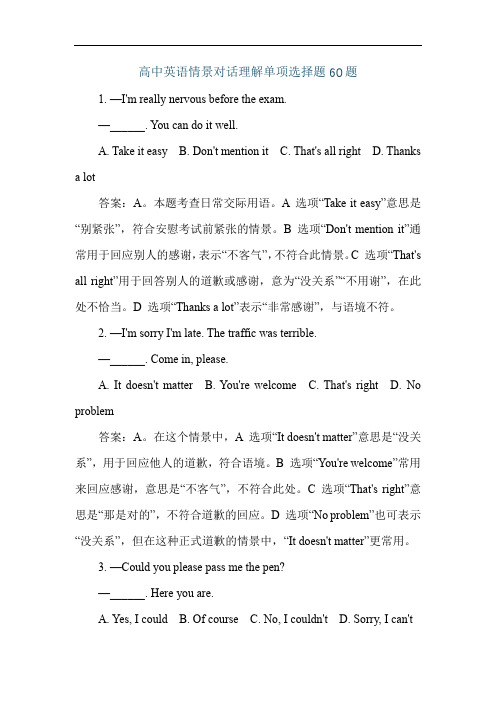
高中英语情景对话理解单项选择题60题1. —I'm really nervous before the exam.—______. You can do it well.A. Take it easyB. Don't mention itC. That's all rightD. Thanks a lot答案:A。
本题考查日常交际用语。
A 选项“Take it easy”意思是“别紧张”,符合安慰考试前紧张的情景。
B 选项“Don't mention it”通常用于回应别人的感谢,表示“不客气”,不符合此情景。
C 选项“That's all right”用于回答别人的道歉或感谢,意为“没关系”“不用谢”,在此处不恰当。
D 选项“Thanks a lot”表示“非常感谢”,与语境不符。
2. —I'm sorry I'm late. The traffic was terrible.—______. Come in, please.A. It doesn't matterB. You're welcomeC. That's rightD. No problem答案:A。
在这个情景中,A 选项“It doesn't matter”意思是“没关系”,用于回应他人的道歉,符合语境。
B 选项“You're welcome”常用来回应感谢,意思是“不客气”,不符合此处。
C 选项“That's right”意思是“那是对的”,不符合道歉的回应。
D 选项“No problem”也可表示“没关系”,但在这种正式道歉的情景中,“It doesn't matter”更常用。
3. —Could you please pass me the pen?—______. Here you are.A. Yes, I couldB. Of courseC. No, I couldn'tD. Sorry, I can't答案:B。
高考英语 语法专题复习 情景交际试题精解

落堕市安心阳光实验学校语法专项(十四) 情景交际考点一交际用语分组记忆第一组1.Good luck.“祝你好运”,表示当对方参加某项活动,如考试、比赛等时,向对方表示祝福的用语。
Congratulations!当对方取得了成功或其他好的事情时,对对方的祝贺语。
2.Have fun!“玩得开心点!”表示对对方去娱乐时的祝愿用语。
3.Best wishes.一般用于信的结尾处表示对对方的祝愿。
第二组1.It's a/my pleasure.(=My pleasure.)“这是我的荣幸”“不客气”,用于别人对你表示感谢时的回答。
2.With pleasure.“我很乐意(帮你)”,表示同意对方的请求,并且自己将付出行动。
第三组1.What's (going) on?“怎么了?”“这里发生什么事了?”“有什么节目?”“上演什么电影?”(询问情况)。
2.What's for?表示目的和用途,一般翻译成“为了什么?”“用来做什么?”“干嘛?”3.What's up?“怎么了?”“有什么事吗?”这句在口语中使用比较广泛。
如有人叫住你或登门访问,而你不明白对方的来意时就可以说“what's up?”(有什么事?有何贵干?)年轻人也常用“What's up?”来打招呼。
如:Hi! Jack, what's up?喂!杰克,近来怎么样?4.What if...=What will or would happen if...?“如果(假如)……将会怎么样?”5.So what?“那又怎么样?”(表示“无所谓”的样子)6.What of it?“那有什么关系呢?“那又怎样?”7.How come?“怎么回事?”“怎么搞的?”“为什么?”“怎么会这样?”通常用在你觉得奇怪而问为什么的时候。
当你不愿回答别人的某个问题时也可以说:“How come?”意思是“Why do you ask that? It's none of your business.”。
英语语法情景交际归纳总结
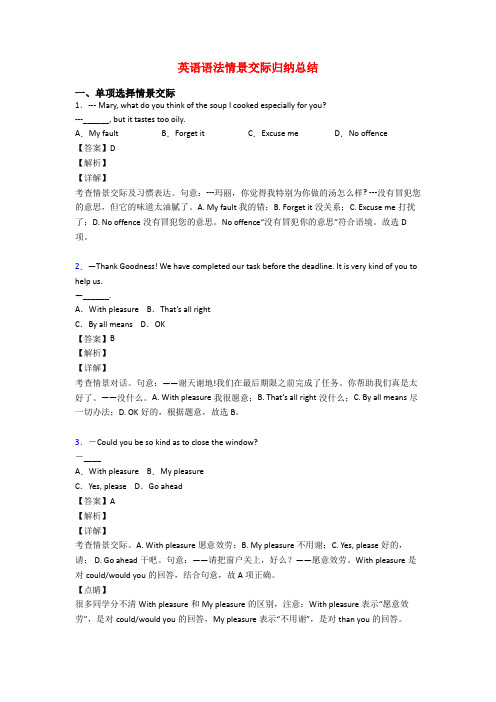
很多同学分不清With pleasure和My pleasure的区别,注意:With pleasure表示“愿意效劳”,是对could/would you的回答,My pleasure表示“不用谢”,是对than you的回答。
4.— Shall we stay at home or go fishing?
15.—Jack has admitted letting out the secret again.
6.—I was going to skate on Sunday, but I can’t go now.
—________.
A.What a pityB.No matter
C.I don’t mindD.Let’s make it at 7:30
【答案】A
【解析】
【详解】
考查情景交际。句意:——我本来打算星期天去滑冰,但是我现在不能去了。——多可惜啊!A. What a pity多可惜啊;B. No matter不介意,不要紧;C. I don’t mind我不介意;D. Let’s make it at 7:30让我们约定七点半吧。对某人不能做某事应表示“遗憾”,故A项正确。
C.it is the thought that countsD.the outsider sees the most of the game
【答案】C
【解析】
【详解】
考查谚语。——哇!你穿那件毛衣看起来很滑稽。——我奶奶送给我的圣诞礼物。你知道,礼轻情意重,更重要的是心意。A. each bird loves to hear himself sing孤芳自赏B. beauty is in the eye of the beholder情人眼里出西施C. it is the thought that counts礼轻情意重,更重要的是心意D. the outsider sees the most of the game旁观者清。故选C。
情景对话
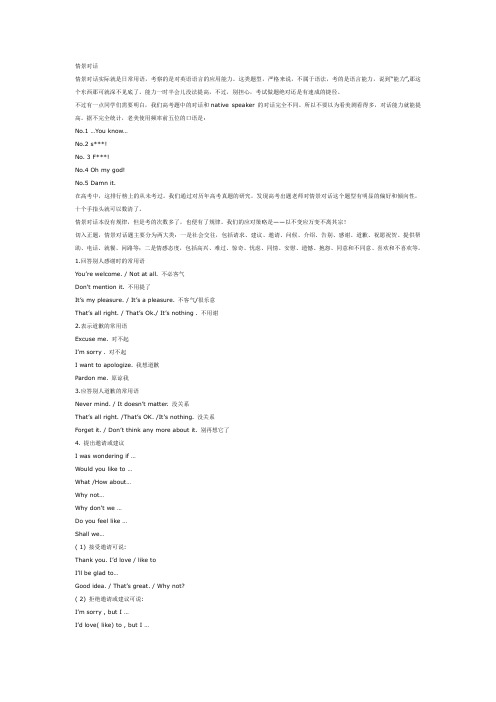
情景对话情景对话实际就是日常用语,考察的是对英语语言的应用能力。
这类题型,严格来说,不属于语法,考的是语言能力,说到“能力”,那这个东西那可就深不见底了。
能力一时半会儿没法提高,不过,别担心,考试做题绝对还是有速成的捷径。
不过有一点同学们需要明白,我们高考题中的对话和native speaker 的对话完全不同。
所以不要以为看美剧看得多,对话能力就能提高。
据不完全统计,老美使用频率前五位的口语是:No.1 …You know…No.2 s***!No. 3 F***!No.4 Oh my god!No.5 Damn it.在高考中,这排行榜上的从未考过。
我们通过对历年高考真题的研究,发现高考出题老师对情景对话这个题型有明显的偏好和倾向性,十个手指头就可以数清了。
情景对话本没有规律,但是考的次数多了,也便有了规律。
我们的应对策略是——以不变应万变不离其宗!切入正题,情景对话题主要分为两大类:一是社会交往,包括请求、建议、邀请、问候、介绍、告别、感谢、道歉、祝愿祝贺、提供帮助、电话、就餐、问路等;二是情感态度,包括高兴、难过、惊奇、忧虑、同情、安慰、遗憾、抱怨、同意和不同意、喜欢和不喜欢等。
1.回答别人感谢时的常用语You’re welcome. / Not at all. 不必客气Don’t mention it. 不用提了It’s my pleasure. / It’s a pleasure. 不客气/很乐意That’s all right. / That’s Ok./ It’s nothing . 不用谢2.表示道歉的常用语Excuse me. 对不起I’m sorry . 对不起I want to apologize. 我想道歉Pardon me. 原谅我3.应答别人道歉的常用语Never mind. / It doesn’t matter. 没关系That’s all right. /That’s OK. /It’s nothing. 没关系Forget it. / Don’t think any more about it. 别再想它了4. 提出邀请或建议I was wondering if …Would you like to …What /How about…Why not…Why don’t we …Do you feel like …Shall we…( 1) 接受邀请可说:Thank you. I’d love / like toI’ll be glad to…Good idea. / That’s great. / Why not?( 2) 拒绝邀请或建议可说:I’m sorry , but I …I’d love( like) to , but I …I’d like to, but I’m afraid I …No , thank you. I can manage it myself.5.提供帮助( 1) 乐意帮忙可说:I’d love( like) to / I’ll be glad toWith ( great) pleasure.Certainly .( 2) 不能帮忙可说:I’m sorry. I can’t / No. I’m afraid not.(易错)注意: Do /Would you mind if I do( did)或Would you mind my doing的答语。
语法专题十七 情景交际【考点精讲精练】-2023年中考语法一点通(教师版)
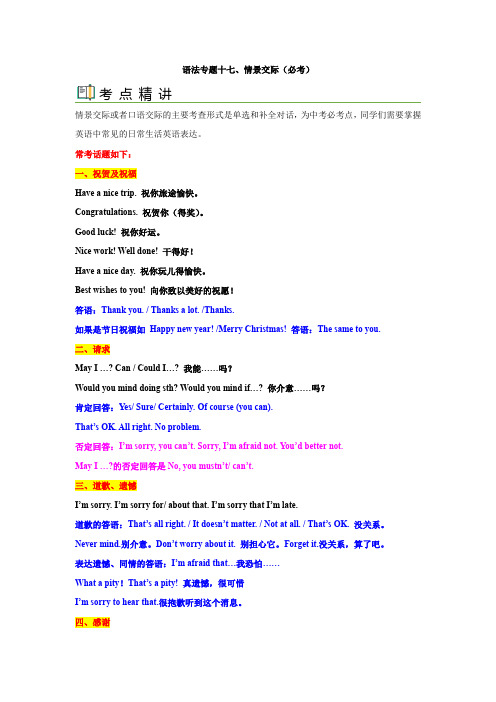
语法专题十七、情景交际(必考)考点精讲情景交际或者口语交际的主要考查形式是单选和补全对话,为中考必考点,同学们需要掌握英语中常见的日常生活英语表达。
常考话题如下:一、祝贺及祝福Have a nice trip. 祝你旅途愉快。
Congratulations. 祝贺你(得奖)。
Good luck! 祝你好运。
Nice work! Well done! 干得好!Have a nice day. 祝你玩儿得愉快。
Best wishes to you! 向你致以美好的祝愿!答语:Thank you. / Thanks a lot. /Thanks.如果是节日祝福如Happy new year! /Merry Christmas! 答语:The same to you.二、请求May I …? Can / Could I…? 我能……吗?Would you mind doing sth? Would you mind if…? 你介意……吗?肯定回答:Yes/ Sure/ Certainly. Of course (you can).That’s OK. All right. No problem.否定回答:I’m sorry, you can’t. Sorry, I’m afraid not. You’d better not.May I …?的否定回答是No, you mustn’t/ can’t.三、道歉、遗憾I’m sorry. I’m sorry for/ about that. I’m sorry that I’m late.道歉的答语:That’s all right. / It doesn’t matter. / Not at all. / That’s OK. 没关系。
Never mind.别介意。
Don’t worry about it. 别担心它。
Forget it.没关系,算了吧。
英语情景口语对话技巧

英语情景口语对话技巧
在英语情景口语对话中,掌握一些技巧是非常重要的。
以下是一些建议和技巧,可以帮助你更自信地与他人交流:
1. 练习发音:清晰准确的发音是英语口语流利的关键。
你需要掌握每个单词的正确发音,并练习发声技巧,如语调、重音和连读等。
2. 听力理解:提高听力理解能力可以帮助你更好地理解对方所说的话,并做出适当的回应。
多听英语音频、视频和与外国人交流可以帮助你提高听力理解能力。
3. 词汇积累:扩大词汇量可以帮助你更准确地表达自己的意思。
通过阅读、听力练习和与他人交流来增加词汇量。
4. 语法掌握:掌握基本的语法规则可以帮助你更准确地表达自己的意思。
了解句子结构、时态和语态等基本语法规则是非常重要的。
5. 日常用语:学习常用的日常用语可以帮助你更好地与他人交流。
了解常见的问候、道别、感谢和道歉等表达方式。
6. 文化了解:了解英语国家的文化背景可以帮助你更好地理解对方的言行举止,避免误解和尴尬。
了解英语国家的礼仪、习俗和价值观等。
7. 保持自信:保持自信的态度可以帮助你更好地表达自己。
不要害怕犯错,多与他人交流,积极寻求反馈和建议。
8. 持续练习:只有通过持续不断的练习才能提高英语口语能力。
尽可能多地与外国人交流,参加英语角、口语班等活动,或者找一个语伴一起练习。
总之,提高英语口语能力需要不断地练习和学习。
掌握以上技巧可以帮助你更自信地与他人交流,提高你的英语口语水平。
【英语】英语语法情景交际归纳总结
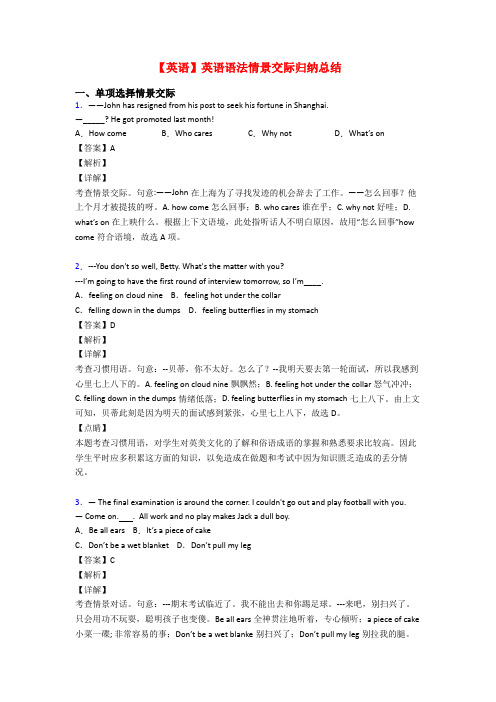
【英语】英语语法情景交际归纳总结一、单项选择情景交际1.——John has resigned from his post to seek his fortune in Shanghai.―_____? He got promoted last month!A.How come B.Who cares C.Why not D.What’s on【答案】A【解析】【详解】考查情景交际。
句意:——John在上海为了寻找发迹的机会辞去了工作。
——怎么回事?他上个月才被提拔的呀。
A. how come怎么回事;B. who cares谁在乎;C. why not好哇;D. what’s on 在上映什么。
根据上下文语境,此处指听话人不明白原因,故用“怎么回事”how come符合语境,故选A项。
2.---You don't so well, Betty. What's the matter with you?---I’m going to have the first round of interview tomorrow, so I’m____.A.feeling on cloud nine B.feeling hot under the collarC.felling down in the dumps D.feeling butterflies in my stomach【答案】D【解析】【详解】考查习惯用语。
句意:--贝蒂,你不太好。
怎么了?--我明天要去第一轮面试,所以我感到心里七上八下的。
A. feeling on cloud nine飘飘然;B. feeling hot under the collar怒气冲冲;C. felling down in the dumps情绪低落;D. feeling butterflies in my stomach七上八下。
由上文可知,贝蒂此刻是因为明天的面试感到紧张,心里七上八下,故选D。
定语从句 情景对话

初二升初三暑假衔接班第十一讲语法探究---初识定语从句(一)定语从句定义:_______________________________________________________________________ _______________________________________________________________________ ____________________________________________Eg. A doctor is a person who looks after pople‟s health.先行词主语谓语宾语(二)图表助理解(三)现场练兵1.I like the music ____ I can sing along with.A.thatB.whoC.whom2.We love the singer ______ clothes are quite cool.A.who B,whose C.whom3.Does he love the car _____ color is black.A.whoseB.whoC.which试比较:(1)A plane is a machine that can fly.( ) ()(2)The noodles that I cooked were delicious.( ) ( ) 专项练习---情景会话(1)A:___1___B:Certainly!____2___A:Well,you know ,____3____ Could you help me? B:Sure .A:___4___B:____5___A:This Saturday .Thank you very much.B:That‟s all right.A. What‟s it ?B. That‟s very kind of you.C. Tom,could you do something for me ,Please?D. I‟m going to move to a new house across town.E. When are you going to move?(2)A:Will you be free this Saturday afternoon?B:____1___A:____2____B:That sounds boring.A:Well.____3___B:Oh, that‟s great .I know you have a very good soccer ball. When and where shall we meet?A:___4____B:It‟s too late.___5____A:Ok.See you then.B:See you.A. How about 3:00 outside the school gate?B. Let‟s play soccer ball.C. How about 2:00.D. Yes.What‟s that?E. Let‟s play tennis together,shall we?A:Will you be free this Saturday afternoon?(3)A:Hello,Emma! Happy New Year to you!B:____1___A : What are you going to do during the holiday?B :____2___How about you,Frank?A :I ‟m going to Chengdu with my parents.B :___3____A :Thanks. By the way ,where …s Jim?B :He isn ‟t at school. I think he must be at home. A :Well. We are starting this afternoon.____4___ B :Sure.___5____A :Thanks .I hope you will have a good time,too.A. I ‟ve no idea.B. Thank you .The same to you.C. Good luck to you.D. Will you please give this note to him?E. Have a good time.(4)A :Good morning ,doctor.B :Good morning ,young man. ____1___ A : I have a sore throat. B :____2___ A :Several days. B :Well, let me see.___3____ A :Ah … B :Hmm. Nothing serious .I ‟ll give yousome pills.___4____ A :Right! Anything else? B : ___5____A. Open your mouth and say “Ah …”B. Keep warm and don ‟t catch cold.C. Take one big one and two small ones three times a day.D. What ‟s the matter?E. How long have you been like this?完型填空Someone says, “Time is money”, but I think time is 1 important than money. Why? Because when money is spent, we can get it back. However, when time is 2 , it‟ll never 3 . That is 4 we must not waste time. It goes without saying that the 5 is usually limited. Ever a second is very important. We should make full use of our time to 6 useful.But it is a pity that there are a lot of people who do not know the importance of the time. They spent their limited time smoking, drinking and 7 . They do not know that wasting time means wasting part of their own 8 .In a word, we should save time. We shouldn‟t 9 today‟s work for tomorrow. Remember we have no time to 10 .( ) 1. A. much B. less C. mush less D. even more( ) 2. A. cost B. bought C. gone D. finished( ) 3. A. return B. carry C. take D. bring( ) 4. A. what B. that C. because D. why( ) 5. A. money B. time C. day D. food( ) 6. A. nothing B. something C. anything D. everything( ) 7. A. reading B. writing C. playing D. working( ) 8. A. time B. food C. money D. life( ) 9. A. stop B. leave C. let D. give( ) 10.A. lose B. save C. spend D. take阅读理解Long, long ago there was a very foolish thief. Do you know what he did one day? When he wanted to steal(偷) the bell on his neighbour‟s door, he walked up to the door, took hold of(抓住) the bell and pulled hard. The bell made a very loud noise. The thief was afraid and went home.Then he sat down to think, “I must do something about the noise,” he said. He thought and thought. At last he had an idea. “Ah, I‟ll put some cotton in my ears. Then I won‟t be able to hear the noise.” The next day he went to the door of his neighbour, and took hold of the bell. This time he pulled even harder. The bell rang loudly, but the thief did not hear anything. With another hard pull he got the bell out. Just then the neighbour came running out.“Steal my bell? I‟ll teach you a lesson(教训),” the angry man shouted. And he hit the thief on the nose.The foolish thief did not know how the neighbour found out he was stealing the bell. “Why did he come out just then?” he wondered (感到疑惑).( )1. The thief was trying to get .A. his neighbourB. his neighbour‟s doorbellC. some cottonD. a door with a bell on it( )2. The thief put some cotton in his ears. He thought it would be for him to steal the doorbell.A. safeB. difficultC. dangerousD. easy( )3. The neighbour ran out probably(很可能) because .A. he knew his doorbell was being stolenB. he thought someone was eager (渴望的) to visit himC. he realized (意识到) something strange happenedD. Both B and C( )4. The neighbour hit the thief to .A. give him lessonsB. punish (惩罚) him for stealingC. help him with the bellD. be his teacher( )5. Which of the following is TRUE?A. The thief understood why he was hit on the nose.B. The thief knew why the neighbour came out.C. The thief thought the neighbour couldn‟t hear the noise the bell made.D. The thief didn‟t want to know why the neighbour ran out.。
语法专题突破(十六) 情景交际

4.—You must look after yourself and keep healthy.
—Yes, I will.Thanks. 5.—The museum is very far from here.Let's catch a bus, shall we? —OK. Let's catch a bus. 6.—You must remember the saying:Whatever you do, do it well.
—Oh,I'm really very sorry.
(2010· 江苏高考)—I have tried very hard to find a solution to the problem,but in vain.
—Why not consult with Frank? You see, ________.
C.Yes,you can
D.No,you needn't
解析:考查交际用语。根据答语的第二句可知空格处表 示的是礼貌的谢绝。 答案:B
1.—May I help you? —Oh,yes,thank you. 2.—Let me help you with the bags. —Well,I can manage all right.Thanks just the same. 3.—Must I clean the classroom now?
8.—Happy birthday!
—Thank you.
(2010· 陕西高考)—What a fine day! Shall we go picnicking? —________. But we need to be home before six o'clock for the football match.
多情景英语常用对话

日常英语口语对话_英语日常对话、习惯语500句(高级)(之一)1. Hold on 等一下(口语中,人们不太用wait a minute)如果两人辩论,吵架,抬杠,你要别人“打住”,可以说,hold it right there.2. I hate his guts. 我最讨厌他。
也有说I hate him guts. Guts 是肠子,相当于“恨之入骨”的意思。
He doesn’t have much guts. 他是个胆小鬼。
ut feeling 直觉3. Nuts, 果仁,核,为复数时,意为“疯子”,He is nuts。
他有神经病。
He went nuts and killeda guy.他发疯了,结果杀了一个人。
You are driving me nuts. 你真是要把我逼疯。
a tough nut to crack, 一项艰巨的任务,一个难解之题4. How is everything? (还好吗?) I am just stuck in a rut, doing the same things every day. I wish I could do something different. (烦死了,每天都是干同样的活,我真想换个活法。
) rut 日常的,每天都如此,get in a rut,日复一日,天天如此5. I have totally sold out to your idea. 我100%地赞同赞同你的意见。
类似的话还有If you are not careful enough, you will buy into his bad idea. 如果你不小心的话,你就会采纳他的这馊主意。
6. I am just ecstatic about going to visit you soon. 马上要见你,我高兴死了。
7. A dap and dip 打个照面,露下脸就走。
情景对话

4.-----Could you make the booking in her name? 预订 ------_____。 A.No problem B.It’s all right C.Fine D.I hope so 5.-----Could you get the butter out of the fridge? ------______?It’s so noisy that I can’t hear。 A. Do you want the money B What will you want to do C. How much D.You what 常用于让对方重 复前面听说的话 6.-----Let’s go shopping first and then go fishing tomorrow。 -----But how will you get there? -----______。I won’t have the car,will I? A.Well,come on B.You go yourself C.That’s a good point D.I’m afraid I don’t agree
五、Go ahead,Help yourself,Here…be类
高考链接:
①-----Could I ask you a rather personal question? -----_____。 A. Yes,don’t worry B.Of course,go ahead C. Yes,help yourself D.Of course,why not ②-----Do you think I could borrow your dictionary? ------_______。 A.Yes,you may borrow B.Yes,you could C.Yes,go on D.Yes,help yourself
口语训练中的情景对话模拟

口语训练中的情景对话模拟主题:口语训练中的情景对话模拟导语:随着社会的发展和国际交流的增多,口语已经成为现代人交流的重要方式。
良好的口语能力不仅能够帮助我们更好地表达自己,还能够提升沟通效果。
为了帮助学生提高口语能力,我设计了一套情景对话模拟教案,旨在让学生通过模拟真实生活中的情景对话来练习口语表达能力,提高他们的口语交际能力。
第一节:问路情景描述:你在外地旅游,突然发现自己迷路了,你需要向陌生人问路。
模拟对话一:A: 你好,请问这附近有个博物馆吗?B: 是的,离这有一段距离。
你可以沿着这条路一直走,然后右拐,再直走几百米,就会看到博物馆的标志牌了。
A: 这样啊,谢谢您!模拟对话二:A: 不好意思,我想找一家咖啡店,您知道附近有吗?B: 当然,附近有一家很不错的咖啡店。
你继续沿着这条街走,然后左转,过了第一个十字路口就能看到了。
A: 好的,谢谢您的指导!小节一:餐厅点餐情景描述:你和朋友一起去餐厅用餐,你需要点餐并向服务员询问一些问题。
模拟对话三:A: 服务员,我可以看一下菜单吗?B: 当然,这是我们的菜单,请您慢慢选择。
A: 我想要一份牛肉炒面和一杯橙汁。
B: 好的,稍等一下,我帮您记录一下。
模拟对话四:A: 请问这道菜是辣的吗?B: 是的,这道菜有一点点辣,但是不会太辣。
A: 那我想试一下,请给我来一份。
B: 好的,我会尽快为您准备。
小节二:购物情景描述:你在商场购物时,需要向售货员询问商品的价格和尺寸等信息。
模拟对话五:A: 售货员,这双鞋的价格是多少?B: 这双鞋的原价是200元,现在正在打折,只需要150元。
A: 好的,那我要这双鞋。
模拟对话六:A: 请问这件衬衫有红色的尺码吗?B: 是的,我们有红色的尺码XS、S和M,请问您需要哪个尺码?A: 我需要M码,请给我看看。
小节三:旅行预订情景描述:你想预订一次旅行,需要向旅行社咨询相关信息并预订行程。
模拟对话七:A: 你好,我打算下个月去北京旅行,请问你们有相关的旅行线路吗?B: 当然,我们有多种不同的旅行线路供您选择。
高中英语情景交际用语总结及练习
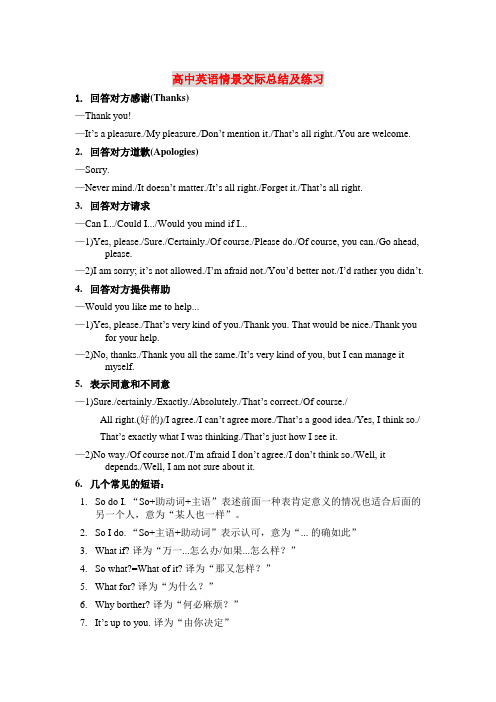
高中英语情景交际总结及练习1.回答对方感谢(Thanks)—Thank you!—It’s a pleasure./My pleasure./Don’t mention it./That’s all right./You are welcome. 2.回答对方道歉(Apologies)—Sorry.—Never mind./It doesn’t matter./It’s all right./Forget it./That’s all right.3.回答对方请求—Can I.../Could I.../Would you mind if I...—1)Yes, please./Sure./Certainly./Of course./Please do./Of course, you can./Go ahead, please.—2)I am sorry; it’s not allowed./I’m afraid not./You’d better not./I’d rather you didn’t.4.回答对方提供帮助—Would you like me to help...—1)Yes, please./That’s very kind of you./Thank you. That would be nice./Thank you for your help.—2)No, thanks./Thank you all the same./It’s very kind of you, but I can manage it myself.5.表示同意和不同意—1)Sure./certainly./Exactly./Absolutely./That’s correct./Of course./All right.(好的)/I agree./I can’t agree more./That’s a good idea./Yes, I think so./ That’s exactly what I was thinking./That’s just how I see it.—2)No way./Of course not./I’m afraid I don’t agree./I don’t think so./Well, it depends./Well, I am not sure about it.6.几个常见的短语:1.So do I. “So+助动词+主语”表述前面一种表肯定意义的情况也适合后面的另一个人,意为“某人也一样”。
情景对话_精品文档
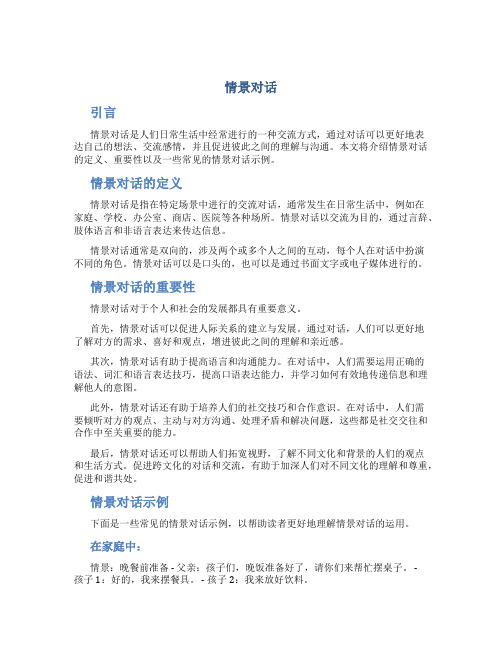
情景对话引言情景对话是人们日常生活中经常进行的一种交流方式,通过对话可以更好地表达自己的想法、交流感情,并且促进彼此之间的理解与沟通。
本文将介绍情景对话的定义、重要性以及一些常见的情景对话示例。
情景对话的定义情景对话是指在特定场景中进行的交流对话,通常发生在日常生活中,例如在家庭、学校、办公室、商店、医院等各种场所。
情景对话以交流为目的,通过言辞、肢体语言和非语言表达来传达信息。
情景对话通常是双向的,涉及两个或多个人之间的互动,每个人在对话中扮演不同的角色。
情景对话可以是口头的,也可以是通过书面文字或电子媒体进行的。
情景对话的重要性情景对话对于个人和社会的发展都具有重要意义。
首先,情景对话可以促进人际关系的建立与发展。
通过对话,人们可以更好地了解对方的需求、喜好和观点,增进彼此之间的理解和亲近感。
其次,情景对话有助于提高语言和沟通能力。
在对话中,人们需要运用正确的语法、词汇和语言表达技巧,提高口语表达能力,并学习如何有效地传递信息和理解他人的意图。
此外,情景对话还有助于培养人们的社交技巧和合作意识。
在对话中,人们需要倾听对方的观点、主动与对方沟通、处理矛盾和解决问题,这些都是社交交往和合作中至关重要的能力。
最后,情景对话还可以帮助人们拓宽视野,了解不同文化和背景的人们的观点和生活方式。
促进跨文化的对话和交流,有助于加深人们对不同文化的理解和尊重,促进和谐共处。
情景对话示例下面是一些常见的情景对话示例,以帮助读者更好地理解情景对话的运用。
在家庭中:情景:晚餐前准备 - 父亲:孩子们,晚饭准备好了,请你们来帮忙摆桌子。
-孩子1:好的,我来摆餐具。
- 孩子2:我来放好饮料。
在学校中:情景:课堂讨论- 教师:请举个例子来解释这个概念。
- 学生1:我举个例子,比如…… - 学生2:我不同意你的观点,我认为……在办公室中:情景:工作分配 - 经理:我们的项目需要一个负责销售的人,谁愿意接手? -员工1:我会做销售工作,我可以负责。
高中英语第18讲:语法满分冲刺17:常见情景对话题解题技巧

SQKC-25 高三一轮复习第15讲课后作业(2013全国大纲卷)21.--I'm sorry I made a mistake!-- . Nobody is perfect.A. Take your timeB. You're rightC. Whatever you sayD. Take it easy 【答案】D。
本题考查情景交际。
乙方是犯了错道歉,从空处后面的“人无完人”来看,另一方是在安慰他/她,所以应该用take it easy,意思是“别紧张”,“放轻松”。
其他三个选项的意思分别是:“不着急,慢慢来”,“你是对的”,“无论你说什么”,均与句意不符,排除。
【句意】—对比起,我搞错了。
—别紧张,人无完人。
(2013全国大纲卷)35. ---Are you sure you won't come for a drink with us?--- ,if you insistA. Not at allB. It depen dsC. All right thenD.I don't care【答案】C。
本题考查情景交际。
空处后面是一个条件状语从句,意思是“如果你坚持”,因此可以推断空处是一个结果,如果你坚持,那结果应该是“我去”,锁定正确【答案】。
【句意】—你肯定你不跟我们一起去喝点东西吗?—那么好吧,如果你坚持(要我去)的话。
【小窍门】情景对话题一定要看准空处之外的提示信息。
(2013福建)33.—Would you mind answering some questions on shopping habits?— ________.A. Yes, with great pleasureB. No, I am afraid I can't make itC. Yes, it is worth the timeD. No, as long as it doesn't take long【答案】D。
英语语法情景交际归纳总结

英语语法情景交际归纳总结一、单项选择情景交际1.—Shall we go out for a walk?—_____.A.Good idea. B.Good luck. C.Have fun. D.Good bye.【答案】A【解析】【详解】考查交际用语。
句意:——我们去散步吧?——好主意!A. Good idea好主意;B. Good luck! 祝你好运;C. Have fun你玩得开心;D. Good bye再见。
根据语境收到一块去散步的邀请,应该是接受,Good idea是接受邀请之意。
故选A。
【点睛】情景对话题主要考查英语的日常用语、习惯用语以及各种场合的交际性语言,并从实际出发,考查交际语言的运用能力。
做题时仔细阅读上下文,找出上下文之间的联系。
2.—Going to Bookuu this weekend?— ! Would you like to go with me?A.You bet. B.You know better C.You got me D.You there【答案】A【解析】【详解】考查情景交际。
A. You bet.你说的没错; B. You know better明事理,有头脑; C. You got me你难住我了; D. You there你在那里。
句意:——这个周末去Bookuu吗?——你说的没错!你愿意和我一起去吗?结合句意可知答案为A。
3.---Hi, Bob! Thanks a lot for lending me the money!---____! Oh, by the way the interest rate is 10%.A.With regards B.With pleasure C.No sweat D.No way【答案】C【解析】【详解】考查交际用语。
——嗨,鲍伯!——谢谢你借我钱!——没关系,哦,顺便提醒一下利率是10%。
A. With regards致以问候;B. With pleasure好的;没问题;C. No sweat没关系;D. No way绝不。
比较级英语语法
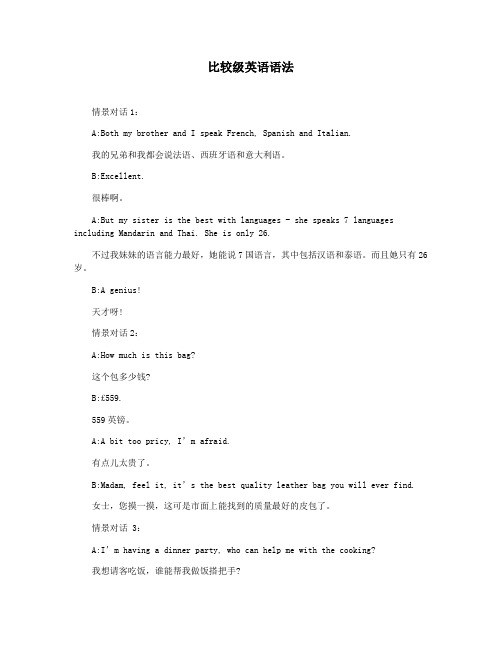
比较级英语语法情景对话1:A:Both my brother and I speak French, Spanish and Italian.我的兄弟和我都会说法语、西班牙语和意大利语。
B:Excellent.很棒啊。
A:But my sister is the best with languages - she speaks 7 languages including Mandarin and Thai. She is only 26.不过我妹妹的语言能力最好,她能说7国语言,其中包括汉语和泰语。
而且她只有26岁。
B:A genius!天才呀!情景对话2:A:How much is this bag?这个包多少钱?B:£559.559英镑。
A:A bit too pricy, I’m afraid.有点儿太贵了。
B:Madam, feel it, it’s the best quality leather bag you will ever find.女士,您摸一摸,这可是市面上能找到的质量最好的皮包了。
情景对话 3:A:I’m having a dinner party, who can help me with the cooking?我想请客吃饭,谁能帮我做饭搭把手?B:I’m the worst cook you can imagine, but I will do what I can.我是最不会做饭的了,不过我会尽力帮忙做我力所能及的事情。
A:No, you are not that bad.别这么说,你没有那么差的。
情景对话4:A:I need someone who can type fast.我要一个打字速度快的帮手。
B:Let’s me try.让我试试吧。
A:How fast can you type?你的速度是多少?B:About 70 words per minute – I typed the fastest in our annual competition.大概每分钟70个词,我是年度打字比赛的冠军呢。
- 1、下载文档前请自行甄别文档内容的完整性,平台不提供额外的编辑、内容补充、找答案等附加服务。
- 2、"仅部分预览"的文档,不可在线预览部分如存在完整性等问题,可反馈申请退款(可完整预览的文档不适用该条件!)。
- 3、如文档侵犯您的权益,请联系客服反馈,我们会尽快为您处理(人工客服工作时间:9:00-18:30)。
情景会话一:考情分析情景会话题目在近几年的高考英语语言知识运用的测试中频频出现,有时候单项填空试题共计15道,其中情景会话题就占了两道,与其它语言知识相比,这个考点所占的比例很大。
因此,在高考英语复习的过程中,情景会话题目应该引起足够的重视。
情景会话题目的设计主要是为了测试学生对语言功能的掌握情况,即能否在语境中恰当理解和表达问候、告别、感谢、介绍等交际功能;能否在日常人际交往中有效地使用得体的语言进行表达,如发表意见、进行判断、责备、投拆等。
通过对近几年高考题目的分析,可以看出,情景对话题目根据不同的功能意念主要分为:感谢、道歉、邀请、请求允许、提供帮助、表达不同的态度和情感等几类。
情景会话用语主要考查教学大纲中所规定的常用会话套语。
考查的方式以应答为主,提问为辅;以中英文化差异明显的语言交流项目为重点考查对象。
二、考点梳理1. 习惯应答类许多情景会话中使用的是英美人的习惯用语。
问候、告别、打电话、问路、看病、购物等常见交流话题均有其较为固定的套语。
感谢、道歉、祝愿、请求亦有其固定的应答用语。
对于这类题目,我们要紧紧遵循他们的习惯进行解答。
如: - Waiter!-________- I can't eat this. It's too salty. (NMET 2000)A. Yes, sir?B. What?C. All right?D. Pardon?析:这是服务员与顾客之间的一段对话。
选项A是饭店服务员应答顾客的习惯用语,故选A。
2.表达感谢在表达这一功能时表示感谢的一方通常可以说thank you (very much), thanks a lot, thank you for your he lp, it’s very nice of you, i appreciate your help。
而接受感谢的一方,出于礼貌,必须给予相应的回答:it’s my pleasure, my pleasure, that’s ok/ all right, you’re welcome, don’t mention it,Not at all. I'm glad / happy that... I'm glad you like/ enjoy it.等等。
[考例]- Thank you ever so much for the book you sent me.-________. (1997上海)A. No thanksB. I'm glad you like itC. Please don't say soD. No, it's not so good[考例]- It's been a wonderful evening. Thank you very much.-________.(2002北京)A. My pleasureB. I'm glad to hear thatC. No, thanksD. It's OK3.常用于道歉的应答用语有:Never mind. It doesn't matter. Not at all. That's all right. That is nothing.等等。
[考例]- I'm sorry I broke your mirror.-Oh, really? ________. (NMET 1996)A. It's OK with meB. It doesn't matterC. Don't be sorryD. I don't care[考例]- Sorry, I couldn't come to the party. I was sick that day.- ________. (1996上海)A. I don't know thatB. That's all rightC. Yes, we'll have another partyD. No, the party wasn't held4.常见的祝愿和祝贺用语有:Good luck!Best wishes to you. Have a nice time. Wish you a pleasant journey/ success. Congratulations!Happy Christmas! Happy birthday to you.等等。
而应答用语常有:Thank you. The same to you. You too.等等。
[考例]- I'm taking my driving test tomorrow.-________! (NMET 2002)A. CheersB. Good luckC. Come onD. Congratulations5.接受请求和邀请的应答用语有:With pleasure. I'd be happy/ glad to. Yes, help yourself. No problem. Good idea.等。
拒绝请求和邀请的应答用语有:Sorry, but... I'd rather you... Thank you, but... No way.等等。
[考例]- Would you do me a favour and give me a ride?-________. (1997上海)A. Yes, that's rightB. No troubleC. Never mindD. With pleasure[考例]- What about having a drink?-________. (NMET 2000)A. Good ideaB. Help yourselfC. Go ahead , pleaseD. Me, too[考例]- I'd like to invite you to dinner this Saturday, Mr Smith.-________. (NMET 1997)A. Oh, no. Let's notB. I'd rather stay at homeC. I'm very sorry, but I have other plansD. Oh, no. That'll be too much trouble [C][考例]- I wonder if I could use your telephone.-________. (1996上海)A. I wonder howB. I don't wonderC. Sorry, it's out of orderD. No wonder, here it is[考例]- I don't have any change with me. Will you pay the fare for me?-________. (2000上海)A. That's fineB. Nothing seriousC. Never mindD. No problem[考例]-I think you should phone Jenny and say sorry to her.-________. It was her fault. (NMET 2003)A. No wayB. Not possibleC. No chanceD. Not at all6.其它习惯应答用语[考例] -Hello. May I speak to Zhao Hua?-Yes. ________. (MET1992)A. My name's Zhao HaoB. I'm Zhao HuaC. This is Zhao Hua speakingD. Zhao Hua's me[考例]- Let me introduce myself, I'm Albert.-________. (NMET1993)A. What a pleasureB. It's my pleasureC. Pleased to meet youD. I'm very pleased三、考点精析1.请求语A.1)May/Can I...Excuse me,can I...Will/Would you please...Would you like to...[应答]Yes./Certainly./Sure./Of course(you may)./Yes,do please./All right./With pleasure.[注]对于Would you like to... 一句的应答还可以是:Yes,I'd like to(love)to./Yes,I'll be glad to...2)Would(Will)you be so kind as to...[应答]Certainly./OK./Sure./Why,of course./That's no prob-lem at all.3)Would you mind doing sth./if I...[应答]Not at all./Certainly(Of course)not./Of course I wouldn't.[注]以上请求语中常用could,might和would代替can,may,will,以表示语气委婉,但在答语中应分别用can,may,will,以表示态度诚恳.4)I wonder if you can(could)...[应答]Certainly I can...5)How(What) about...[注]对于请求的应答,如不能答出,则委婉地说:I'm sorry./Sorry,but I can't./I'm afraid.../Sorry.I'm afraid I can't./I regret that I can't...B.1)May I speak to...[应答]Sorry,he/she isn't in.Can I take a message for him/her2)Would/Will you please give this note/message to...[应答]OK./Certainly.3)Would/Will you take a message for me[应答]No problem.What's the message2.建议语Let's.../Shall we... /How(What)about... /Why don't you... /Why not... /You'd better (I)might be a good idea to.../I suggest...3.破交流定势类汉语和英语在文化方面有许多共同之处,但也存在着诸多差异。
